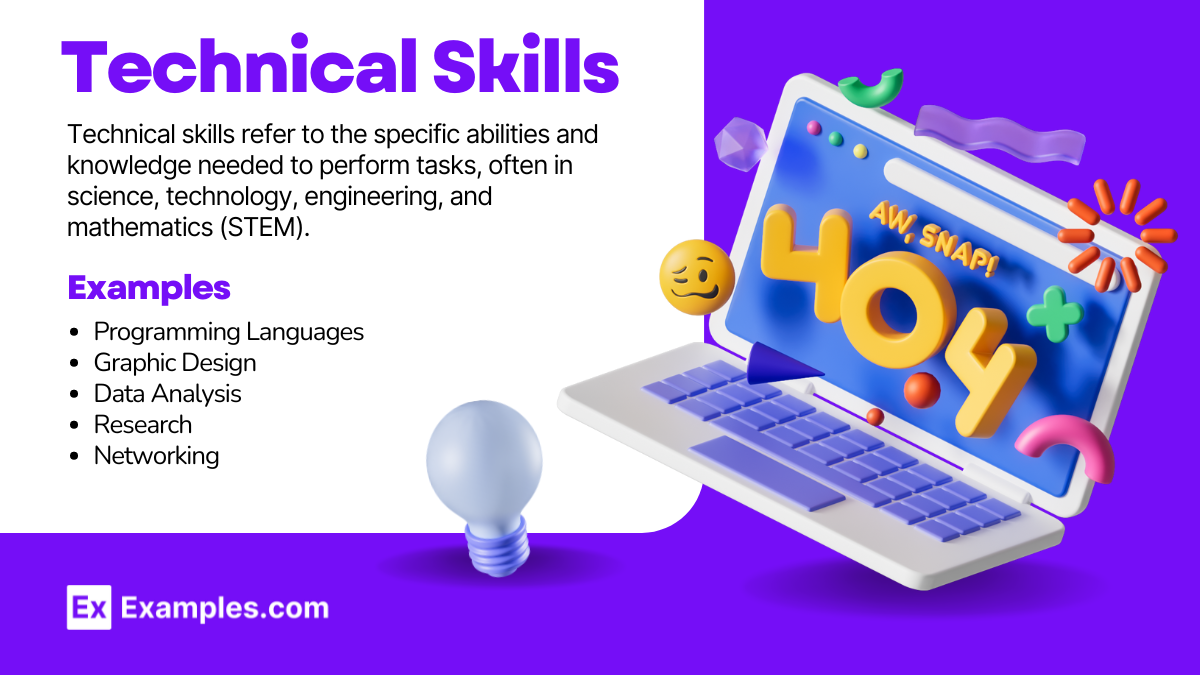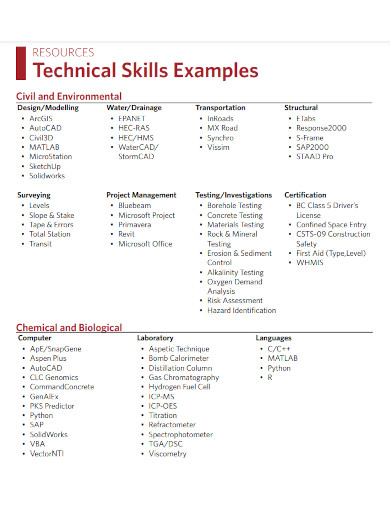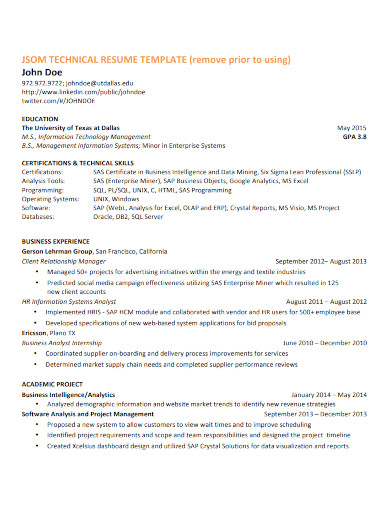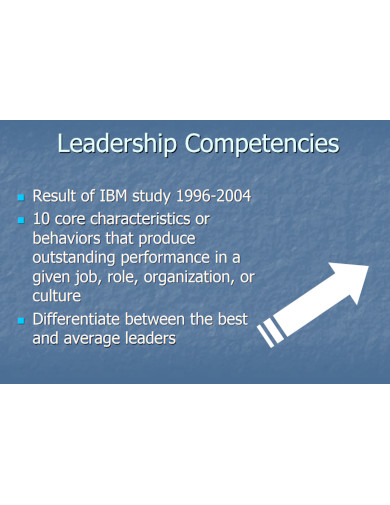100+ Technical Skills Examples
Technical skills are essential in today’s fast-paced and technology-driven world. Mastering these skills can significantly enhance one’s career prospects and productivity. From coding and data analysis to engineering and network management, technical proficiency opens doors to numerous opportunities. This article delves into the importance of technical skills, highlighting their impact on various industries and providing insights on how to develop and improve them. Whether you’re a seasoned professional or just starting your career, understanding and honing your technical skills can give you a competitive edge in the job market.
What are Technical Skills?
Technical skills refer to the specific abilities and knowledge required to perform particular tasks, often related to science, technology, engineering, and mathematics (STEM). These skills are usually practical and specialized, allowing individuals to efficiently execute tasks that require technical expertise.
Technical skills Examples
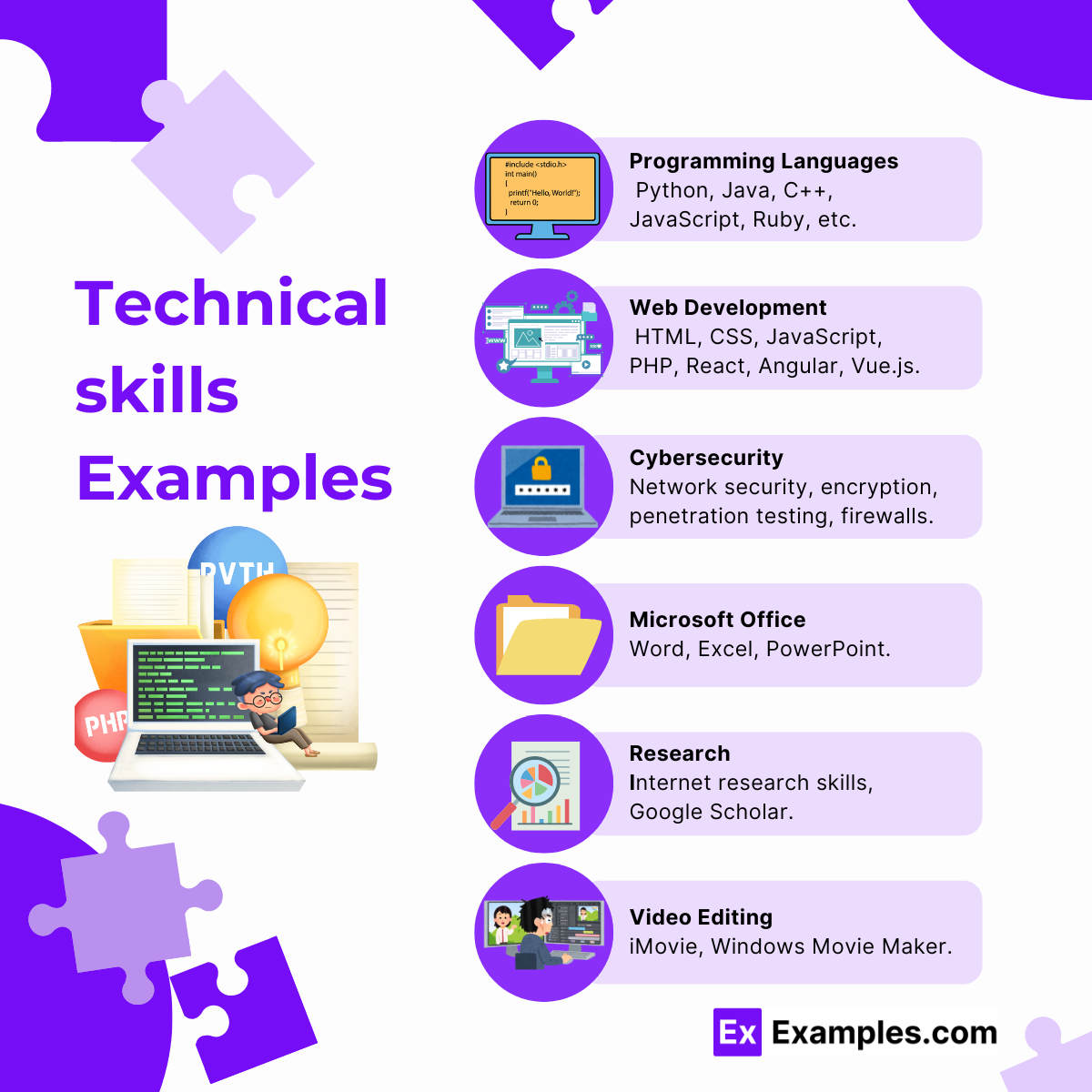
Information Technology (IT) and Software Development
- Programming Languages: Proficiency in languages such as Python, Java, C++, JavaScript, Ruby, etc.
- Web Development: HTML, CSS, JavaScript, PHP, React, Angular, Vue.js.
- Database Management: SQL, MySQL, MongoDB, Oracle.
- Cloud Computing: AWS, Azure, Google Cloud Platform (GCP).
- DevOps: Docker, Kubernetes, Jenkins, Ansible, Terraform.
- Operating Systems: Linux, Windows, macOS.
- Cybersecurity: Network security, encryption, penetration testing, firewalls.
- Networking: TCP/IP, DNS, DHCP, routing, switching.
- Version Control Systems: Git, SVN, Mercurial.
- API Development and Integration: RESTful APIs, GraphQL.
- Mobile Development: iOS (Swift), Android (Kotlin/Java), Flutter, React Native.
- Machine Learning: TensorFlow, PyTorch, Scikit-learn.
- Data Analysis: R, Python (Pandas, NumPy), MATLAB.
- Software Testing: Automated testing, Selenium, JUnit, TestNG.
- Virtualization: VMware, Hyper-V, VirtualBox.
Engineering
- CAD Software: AutoCAD, SolidWorks, CATIA.
- 3D Modeling: Blender, Maya, 3ds Max.
- Circuit Design: Altium, Eagle, OrCAD.
- Robotics: ROS (Robot Operating System), Arduino, Raspberry Pi.
- Mathematical Modeling: MATLAB, Simulink.
- Finite Element Analysis (FEA): ANSYS, Abaqus.
- Embedded Systems: VHDL, Verilog, C/C++ for microcontrollers.
- Control Systems: PLC programming, SCADA.
Data Science and Analytics
- Data Visualization: Tableau, Power BI, D3.js.
- Statistical Analysis: SPSS, SAS, STATA.
- Big Data Technologies: Hadoop, Spark, Kafka.
- ETL Tools: Talend, Informatica, Apache Nifi.
- Natural Language Processing (NLP): NLTK, SpaCy, Gensim.
- Data Warehousing: Redshift, BigQuery, Snowflake.
Design and Multimedia
- Graphic Design: Adobe Photoshop, Illustrator, InDesign.
- Video Editing: Adobe Premiere Pro, Final Cut Pro, DaVinci Resolve.
- Animation: Adobe After Effects, Toon Boom, Blender.
- UI/UX Design: Sketch, Figma, Adobe XD, InVision.
Finance and Accounting
- Financial Analysis: Excel, QuickBooks, SAP, Oracle Financials.
- Tax Preparation: TurboTax, H&R Block, TaxAct.
- Investment Management: Bloomberg Terminal, Morningstar Direct.
- Enterprise Resource Planning (ERP): SAP ERP, Oracle ERP, Microsoft Dynamics.
Healthcare and Life Sciences
- Electronic Health Records (EHR): Epic, Cerner, Meditech.
- Medical Imaging: DICOM, PACS, MRI, CT scans.
- Biostatistics: R, SAS, SPSS.
- Clinical Research Tools: REDCap, OpenClinica, EDC systems.
Project Management
- Project Management Software: Microsoft Project, Trello, Asana, JIRA.
- Agile Methodologies: Scrum, Kanban, Lean.
- Business Process Modeling: BPMN, Visio, Lucidchart.
- Risk Management: Risk analysis tools, SWOT analysis, Monte Carlo simulation.
Miscellaneous
- CRM Software: Salesforce, HubSpot, Zoho CRM.
- Marketing Automation: Marketo, HubSpot, Pardot.
- SEO/SEM: Google Analytics, Google AdWords, SEMrush.
- Content Management Systems (CMS): WordPress, Joomla, Drupal.
- E-commerce Platforms: Shopify, Magento, WooCommerce.
- Customer Support Software: Zendesk, Freshdesk, Intercom.
- IT Service Management (ITSM): ServiceNow, BMC Remedy, JIRA Service Desk.
For Students
- Basic Programming: Python, Scratch.
- Microsoft Office: Word, Excel, PowerPoint.
- Basic Web Development: HTML, CSS.
- Graphic Design: Canva, Adobe Spark.
- Data Analysis: Google Sheets, Excel.
- Video Editing: iMovie, Windows Movie Maker.
- Online Collaboration: Google Docs, Google Drive.
- Research: Internet research skills, Google Scholar.
For Interview
- Public Speaking: Presentation skills, storytelling.
- Problem Solving: Analytical thinking, logical reasoning.
- Technical Demonstration: Hands-on coding, live problem-solving.
- Project Management: Task organization, time management.
- Data Interpretation: Charts and graphs, data-driven decision-making.
- Software Proficiency: Relevant tools for the job (e.g., Excel, Python).
- Communication: Clear and concise explanations, active listening.
- Mock Interviews: Practice sessions, feedback integration.
In Management
- Project Management Software: Microsoft Project, Trello, Asana.
- Resource Allocation: Budgeting tools, resource planning software.
- Performance Tracking: KPI dashboards, performance management systems.
- Data Analysis: Excel, Tableau, Power BI.
- Communication Tools: Slack, Microsoft Teams.
- Risk Management: Risk assessment tools, SWOT analysis.
- Strategic Planning: Balanced scorecard, strategic mapping.
- Conflict Resolution: Mediation techniques, negotiation skills.
For CV
- Technical Skills Section: Programming languages, software tools.
- Certifications: Relevant certifications (e.g., AWS Certified Solutions Architect).
- Project Experience: Description of projects and technologies used.
- Software Proficiency: Industry-standard software (e.g., AutoCAD, Salesforce).
- Data Analysis: Excel, R, Python for data manipulation.
- Networking: TCP/IP, network configuration.
- Cybersecurity: Firewall configuration, encryption protocols.
- Languages: Any additional programming or spoken languages.
For Freshers
- Basic Programming: Java, Python.
- Database Management: SQL, MySQL.
- Web Development: HTML, CSS, JavaScript.
- Software Development: Version control (Git), debugging tools.
- Mobile Development: Basic Android or iOS development.
- Networking Basics: TCP/IP, basic router configuration.
- Cloud Basics: Introduction to AWS or Azure.
- Cybersecurity Basics: Understanding of firewalls, antivirus.
In Sports
- Performance Analysis: Use of software like Dartfish, Hudl.
- Wearable Technology: Familiarity with devices like Fitbit, Garmin.
- Data Analytics: Analyzing performance data, statistics.
- Video Analysis: Tools for reviewing game footage.
- Training Software: Training management platforms (e.g., TeamBuildr).
- GPS Tracking: Understanding of GPS-based performance tracking.
- Injury Management: Use of software for injury tracking and recovery.
- Simulation Tools: Virtual reality for training simulations.
In Writing
- Word Processing: Microsoft Word, Google Docs.
- Grammar and Style Checking: Grammarly, Hemingway Editor.
- Content Management: WordPress, Joomla.
- SEO Writing: Yoast SEO, Google Analytics.
- Research Tools: Zotero, EndNote.
- Collaborative Writing: Google Docs, Dropbox Paper.
- Scriptwriting: Final Draft, Celtx.
- Publishing Software: Adobe InDesign, Scrivener.
In Computer
- Operating Systems: Windows, macOS, Linux.
- Hardware Troubleshooting: Diagnostic tools, hardware repair.
- Networking: Router configuration, network setup.
- Software Installation: Installation and configuration of applications.
- Security: Antivirus software, encryption tools.
- Backup Solutions: Using backup software, cloud storage.
- Virtualization: VMware, VirtualBox.
- Command Line: Basic commands in Bash, PowerShell.
In Training
- E-learning Platforms: Moodle, Blackboard.
- Video Conferencing: Zoom, Microsoft Teams.
- Content Creation: Camtasia, Articulate 360.
- Learning Management Systems (LMS): TalentLMS, Docebo.
- Assessment Tools: Kahoot!, Quizlet.
- Interactive Presentations: Prezi, Mentimeter.
- Virtual Training: VR training environments, simulation tools.
- Instructional Design: ADDIE model, Bloom’s taxonomy.
How to list technical skills on a resume
Listing technical skills on a resume effectively can significantly enhance your chances of catching the attention of recruiters and hiring managers. Here are some guidelines and tips to help you list your technical skills in a compelling way:
1. Identify Relevant Technical Skills
- Job Description Match: Review the job description and identify the technical skills required for the role.
- Industry Standards: Consider common skills in your industry or field.
- Your Expertise: List the skills you possess, including software, tools, programming languages, and technical methodologies.
2. Categorize Your Skills
- Programming Languages: Java, Python, C++, JavaScript, etc.
- Software and Tools: Microsoft Office Suite, Adobe Creative Suite, AutoCAD, etc.
- Technical Tools: Jira, Git, Docker, Jenkins, etc.
- Frameworks and Libraries: React, Angular, Django, etc.
- Certifications: AWS Certified Solutions Architect, Cisco Certified Network Associate (CCNA), etc.
- Operating Systems: Windows, Linux, macOS, etc.
3. Use a Skills Section
Create a dedicated section for technical skills on your resume. This can be placed at the top, after your summary or objective, or towards the end, depending on your preference and resume layout.
4. Highlight Proficiency Levels
- Basic: Familiar with the skill, but not heavily experienced.
- Intermediate: Competent and able to use the skill independently.
- Advanced: Expert level, can use the skill in complex scenarios and teach others.
- Expert: Recognized authority or industry leader in the skill.
5. Integrate Skills into Experience
Incorporate your technical skills into your work experience section to show how you have applied them in real-world situations.
6. Use Keywords
Use keywords from the job description to optimize your resume for Applicant Tracking Systems (ATS).
7. Prioritize Important Skills
List the most relevant and important skills first. Tailor this section for each job application to align with the specific requirements.
Why are Technical Skills Important?
Technical skills are crucial for several reasons, especially in today’s increasingly digital and technology-driven world. Here are some key reasons why technical skills are important:
1. Job Performance
- Efficiency and Productivity: Technical skills enable you to perform tasks more efficiently and productively. They help you use tools, software, and technologies effectively.
- Problem-Solving: With the right technical skills, you can troubleshoot and solve problems more quickly, reducing downtime and increasing overall efficiency.
2. Career Advancement
- Competitive Edge: Having strong technical skills gives you a competitive edge in the job market. Employers often prioritize candidates with specific technical competencies.
- Career Growth: Mastery of technical skills can lead to promotions and career advancement. It positions you as a valuable asset to your organization.
- Adaptability: Technical skills enhance your ability to adapt to new roles and responsibilities, especially as technology evolves.
3. Economic Benefits
- Higher Earnings: Professionals with in-demand technical skills often command higher salaries and better job benefits.
- Job Security: Technical skills can provide job security as companies continue to rely on technology. Being proficient in current technologies makes you less likely to be replaced.
4. Innovation and Development
- Creativity: Technical skills enable you to create, innovate, and contribute to new product development and improvement.
- Efficiency Improvements: Skilled individuals can develop new methods and systems to improve processes and workflows, leading to organizational efficiency and innovation.
5. Meeting Industry Demands
- Relevant Skills: Many industries have a growing demand for technical skills due to technological advancements. Meeting these demands ensures you stay relevant in your field.
- Compliance and Standards: Certain technical skills are necessary to comply with industry standards, regulations, and best practices.
6. Enhanced Collaboration
- Interdisciplinary Work: Technical skills facilitate collaboration with other departments and professionals. They enable you to understand and contribute to technical discussions.
- Project Management: Technical proficiency is often essential for managing projects that involve technology, ensuring they are completed on time and within budget.
7. Personal Development
- Continuous Learning: Developing technical skills fosters a mindset of continuous learning and growth. This adaptability is valuable in both personal and professional contexts.
- Confidence: Mastery of technical skills boosts your confidence in your abilities to tackle complex tasks and challenges.
How to Keep your Technical Skills Current
Keeping your technical skills current is essential in today’s rapidly evolving job market. Here are some strategies to help you stay updated:
1. Continuous Learning
- Online Courses: Platforms like Coursera, Udemy, edX, and LinkedIn Learning offer courses on the latest technologies and skills.
- Certifications: Obtaining certifications in relevant fields can enhance your knowledge and credibility.
2. Reading and Research
- Blogs and Articles: Follow industry blogs, online magazines, and websites like TechCrunch, Wired, and Medium.
- Books: Read books by experts in your field to gain deeper insights and understanding.
3. Hands-On Practice
- Personal Projects: Work on personal or open-source projects to apply new skills.
- Hackathons and Competitions: Participate in hackathons and coding competitions to test your skills in real-world scenarios.
4. Networking
- Meetups and Conferences: Attend industry meetups, conferences, and webinars to learn from peers and experts.
- Professional Associations: Join associations related to your field to stay connected and informed.
5. Collaboration and Mentorship
- Mentorship: Find a mentor or become one to exchange knowledge and experiences.
- Collaboration: Work with others on projects to gain different perspectives and skills.
6. Staying Updated with Trends
- Newsletters and Podcasts: Subscribe to newsletters and listen to podcasts that discuss the latest trends and technologies.
- Forums and Communities: Engage in online forums and communities like Stack Overflow, Reddit, and GitHub.
7. Formal Education
- Advanced Degrees: Consider pursuing advanced degrees or attending workshops and seminars offered by universities.
8. Experimentation
- New Tools and Technologies: Regularly explore and experiment with new tools, languages, and technologies.
- Feedback and Reflection: Seek feedback on your work and reflect on areas for improvement.
9. Teaching and Sharing Knowledge
- Write Blog Posts: Share your knowledge and experiences through blog posts.
- Teach Courses: Teaching others can reinforce your own understanding and keep you updated on the latest developments.
What Technical Skills Are Employees Looking for?
In 2024, several technical skills are highly sought after by employers across various industries. Here are some of the most in-demand technical skills:
- Artificial Intelligence (AI) and Machine Learning (ML):
- These skills are crucial as AI and ML technologies continue to revolutionize industries. Proficiency in AI frameworks, natural language processing, and deep learning architectures is valuable. Roles such as AI engineers and ML specialists are in high demand due to the increasing integration of AI in business operations.
- Data Science and Analytics:
- The ability to analyze and interpret large datasets is vital. Skills in data science, data engineering, and data visualization are highly prized. Proficiency in tools like Python, SQL, and platforms such as Tableau or PowerBI is beneficial. These roles help companies make data-driven decisions and gain insights into market trends.
- Cloud Computing:
- Expertise in cloud platforms like AWS, Azure, and Google Cloud is essential as more businesses move to cloud-based solutions. Skills in cloud architecture, deployment, and management are critical. Roles such as cloud engineers and solutions architects are in high demand.
- Cybersecurity:
- With the rise in cyber threats, cybersecurity remains a top priority. Skills in threat analysis, data encryption, and network security are crucial. Cybersecurity specialists are needed to protect organizational data and maintain secure IT environments.
- Programming Languages:
- Proficiency in programming languages like Python, Java, JavaScript, and C++ is foundational. These languages are used in various applications, from web development to AI and data science. Developers with strong coding skills are always in demand.
- User Experience (UX) Design:
- Ensuring that technology is user-friendly is essential. UX designers who can conduct market research, create user personas, and design intuitive interfaces are highly valued. This role is critical for enhancing customer satisfaction and engagement.
- Blockchain:
- Blockchain technology is growing beyond cryptocurrencies, with applications in finance, supply chain, and more. Skills in blockchain development, including knowledge of smart contracts and distributed ledgers, are increasingly important.
- Adaptability and Lifelong Learning:
- Besides technical skills, adaptability and a commitment to continuous learning are crucial. The fast-paced nature of technology requires professionals to continuously update their skills and stay abreast of new developments.
1. Technical Skills Examples
2. Technical Skills Resume Template
3. Developing Technical Leadership Skills
How to Obtain Technical Skills
Technical skills are abilities that have practical applications that will result in a specific outcome or output. This means that one can obtain technical skills through two different methods. One is via the learning of theoretical knowledge related to technical skills and the other is through the practical knowledge obtained through practice and other practical experiences.
1.) Create an Outline or a Schedule
Technical skills take a very long time to obtain and refine. To effectively get technical skills, you must create a plan, outline, timeline, or schedule with all of your learning objectives. Not will the plan or outline help you pace yourself, but it will also provide you with a salient deadline.
2.) Read Books and Watch Tutorials
You can learn, obtain, and refine your technical skills by reading books and watching tutorials about them. You can learn theories and the history of the technical skill by doing said step as it provides you with a foundation. Note that theory is different from techniques as the latter is more of a practical application of technical skill.
3.) Practically Apply the Technical Skill
Technical skills are skills with a practical application attached to them. This means that one can acquire techniques and processes that will improve the efficiency of your technical skill. You can obtain these by practically practicing and applying the technical skill in real life. For example, if the technical skill you want to acquire is painting, then you must practice your painting skills by making paintings or portraits.
4.) Participate in Classes and Seminars
One of the best ways to obtain technical skills is to obtain them from someone who has plenty of experience in that field. You can do this by applying and participating in classes, seminars, and mentorships.
What are technical skills?
Technical skills are specific abilities or knowledge needed to perform practical tasks, often involving technology, software, machinery, or scientific techniques.
Why are technical skills important?
Technical skills enhance job performance, efficiency, and innovation, making employees valuable assets in technology-driven industries.
How can I improve my technical skills?
Improve technical skills by taking online courses, attending workshops, practicing regularly, and staying updated with industry trends.
What are examples of technical skills?
Examples include programming, data analysis, cybersecurity, network management, and proficiency in software like Excel or Photoshop.
How do I list technical skills on a resume?
List technical skills in a dedicated section, highlighting those relevant to the job and backing them with specific examples or certifications.
Are technical skills more important than soft skills?
Both are crucial; technical skills are job-specific, while soft skills enhance teamwork, communication, and adaptability.
Can technical skills be self-taught?
Yes, many technical skills can be self-taught through online resources, tutorials, and practice.
What technical skills are in high demand?
High-demand technical skills include cloud computing, AI, machine learning, data science, and cybersecurity.
How do technical skills vary by industry?
Technical skills vary widely; IT requires coding, healthcare needs medical technology proficiency, and engineering demands CAD expertise.
What is the role of technical skills in career advancement?
Technical skills facilitate career growth by enabling higher job performance, opening up advanced roles, and increasing employability.



